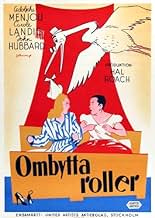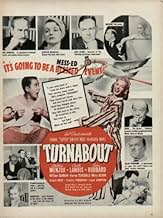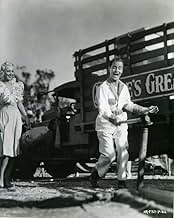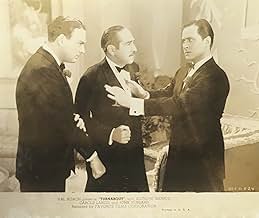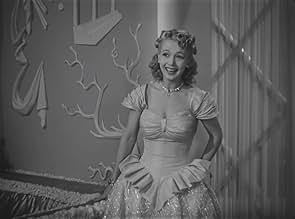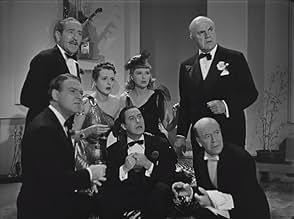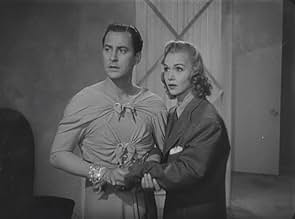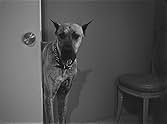Bickering husband and wife Tim and Sally Willows mutter a few angry words to a statue of Buddha and wind up living each other's life.Bickering husband and wife Tim and Sally Willows mutter a few angry words to a statue of Buddha and wind up living each other's life.Bickering husband and wife Tim and Sally Willows mutter a few angry words to a statue of Buddha and wind up living each other's life.
Featured reviews
Carole Landis and John Hubbard play Sally and Tim Willows, a fairly bland married couple whose bickering accelerates to a point where they wish aloud that they could trade places
and whose wish is granted by a statue that sits on their bedroom shelf.
The opening scenes meander a bit, but we get to know Tim's eccentric business partners, their catty wives with whom Sally hangs out, and the Willows' domestic staff—all nicely played by a cast of veteran character actors led by Adolphe Menjou as one of Tim's partners.
It's when Sally and Tim switch bodies that the picture takes off—that is, when Sally takes on the personality and mannerisms of Tim, and vice versa. Landis and Hubbard are both hilarious; Landis is especially funny when she affects her husband's athletic swagger and broad gestures.
Donald Meek and Marjorie Main are typically entertaining as valet and cook; Mary Astor lends an edge as Menjou's wife. Franklin Pangborn has a funny bit as a Mr. Pingboom (not Mr. Pingpong, as he is called to his annoyance).
Other memorable moments include Landis (in her ultra-masculine persona) shinnying up a flagpole to install a radio aerial, and a rather surreal scene in which Menjou and William Gargan attempt to destroy a radio that just won't shut off. (They break it to pieces but it just keeps on playing.)
It's no classic but done in good spirits and occasionally hilarious.
The opening scenes meander a bit, but we get to know Tim's eccentric business partners, their catty wives with whom Sally hangs out, and the Willows' domestic staff—all nicely played by a cast of veteran character actors led by Adolphe Menjou as one of Tim's partners.
It's when Sally and Tim switch bodies that the picture takes off—that is, when Sally takes on the personality and mannerisms of Tim, and vice versa. Landis and Hubbard are both hilarious; Landis is especially funny when she affects her husband's athletic swagger and broad gestures.
Donald Meek and Marjorie Main are typically entertaining as valet and cook; Mary Astor lends an edge as Menjou's wife. Franklin Pangborn has a funny bit as a Mr. Pingboom (not Mr. Pingpong, as he is called to his annoyance).
Other memorable moments include Landis (in her ultra-masculine persona) shinnying up a flagpole to install a radio aerial, and a rather surreal scene in which Menjou and William Gargan attempt to destroy a radio that just won't shut off. (They break it to pieces but it just keeps on playing.)
It's no classic but done in good spirits and occasionally hilarious.
This Hal Roach production from 1940 is a great comedy with outstanding actors and plenty of laughs. There is a sex change and body swapping between a husband and wife, the wife role is played by Carole Landis,(Sally Willows), "I Wake Up Screaming" and the husband is performed by John Hubbard, (Tim Willows). These two married couples have a statue of a Buddha which has magical powers and seems to be getting tired of this couple arguing about each other, so he offers this couple a chance to change their sex in order for the wife to perform her husbands duties at the office and the husband will perform the duties of the wife at home. In this household there is a great Dane dog and a bear cub running all around their dwellings. Sally Willows even climbs a flag pole in order to put up an Aeriel. William Gargan, (Joel Clare) and Mary Astor gave great supporting roles. Carole Landis gave a great performance through out the entire picture and was very young and beautiful in this film.
Turnabout is the story of a married couple who bickers more than anyone you've ever seen. Mr. Willows (John Hubbard) and Mrs. Willows (Carole Landis) lead separate lives, and come home to fight about it. Mr. Willows is a partner for an advertising company and Mrs. Willows gossips and plays bridge with the other partners' wives. But there is one thing they can agree upon; they would love to switch lives with each other. A mysterious statue in their bedroom grants their request, and off he goes in a dress and off she goes prancing around in a suit. To say that their acquaintances are surprised would be an understatement and hilarity ensues.
Also appearing are famous names like Adolphe Menjou, Mary Astor, Inez Courtney, and Marjorie Main.
Stories like this are always entertaining, and when comedies are made on the Hal Roach lot, you're bound for success. This little known gem holds plenty of laughs, but it also abounds with a lightheartedness that can cheer anyone up on a bad day.
Also appearing are famous names like Adolphe Menjou, Mary Astor, Inez Courtney, and Marjorie Main.
Stories like this are always entertaining, and when comedies are made on the Hal Roach lot, you're bound for success. This little known gem holds plenty of laughs, but it also abounds with a lightheartedness that can cheer anyone up on a bad day.
A mystical bust of a turbaned god gives a bickering, unsatisfied married couple exactly what they want: they switch bodies...but unfortunately not voices, which means the husband--who is one-third of a partnership in a big city advertising firm--talks like a girl and prances around his office complete with pocketbook! Very early entry in the body-switching genre is much fresher than some of the similar comedies which followed years later; the film doesn't have an esteemed reputation, so it's difficult to imagine that it influenced other pictures, but surely this was the starting point (or close to it). There are some very fast, very funny lines, quick and efficient gags, bright performers--however the first thirty minutes (a straight satire on big business before the 'magical' troubles begin) is just fine all by itself. The body-switching ploy pretty much comes out of nowhere and sticks out as a gimmick, when actually the movie was progressing very well without it. **1/2 from ****
Bickering husband and wife (John Hubbard, Carole Landis) have their minds switched thanks to a magic statue they call Mr. Ram. Landis is gorgeous, funny, and the primary reason to recommend this movie. Hubbard is OK but nothing special. The supporting cast includes Donald Meek, William Gargan, Franklin Pangborn, and Marjorie Main. Solid supporting actors all. Mary Astor appears in a wasted role as a friend of Landis' before The Maltese Falcon would reinvigorate her career the following year. Adolphe Menjou is annoying as a partner in the husband's ad agency. His entire role in the movie is yelling at various people. It gets old fast.
The madcap stuff doesn't really get underway until about midway through. The first 35-40 minutes is mostly setup, establishing these two characters' personalities and relationships. This probably could have been trimmed down to 10-15 minutes and I believe it would have helped the movie considerably. Everything involving the dog and then the bear was completely irrelevant and seemed to be tacked on because someone thought "Hey! Animals are funny. Let's do that." The first half is a slog to get through but the second half is lots of fun. I saw it years ago and didn't like it but just saw it for a second time and came away with a more favorable opinion. It's a very unique and risqué film for 1940. Carole Landis fans will love it most. It's probably her best role.
The madcap stuff doesn't really get underway until about midway through. The first 35-40 minutes is mostly setup, establishing these two characters' personalities and relationships. This probably could have been trimmed down to 10-15 minutes and I believe it would have helped the movie considerably. Everything involving the dog and then the bear was completely irrelevant and seemed to be tacked on because someone thought "Hey! Animals are funny. Let's do that." The first half is a slog to get through but the second half is lots of fun. I saw it years ago and didn't like it but just saw it for a second time and came away with a more favorable opinion. It's a very unique and risqué film for 1940. Carole Landis fans will love it most. It's probably her best role.
Did you know
- TriviaPolly Ann Young, who plays Miss Twill, is the older sister of film star Loretta Young.
- GoofsWhen the woman's personality is in the man's body and the actor in the part shows this with female reactions and gestures, he looks at his fingernails by holding his hand palm up and bending the fingers toward himself. This is the way a man, not a woman, regards their fingernails, and it often appears in fiction as one way by which a man dressed as a woman is caught out. Women study their fingernails by holding a hand palm down and extending the fingers so that they are flat with the rest of the hand.
- Quotes
Sally Willows: Now listen to me, Tim Willows, the situation with this dog of yours has gone entirely too far. He goes to a kennel tomorrow or I go!
Tim Willows: Darling, you wouldn't have much fun in a kennel.
- ConnectionsFollowed by Turnabout (1979)
- SoundtracksMargie
(1920) (uncredited)
Music by Con Conrad and J. Russel Robinson
Lyrics by Benny Davis
Sung by a chorus on radio with modified lyrics
- How long is Turnabout?Powered by Alexa
Details
- Release date
- Country of origin
- Official site
- Language
- Also known as
- Turnabout
- Filming locations
- Production company
- See more company credits at IMDbPro
- Runtime1 hour 23 minutes
- Color
- Aspect ratio
- 1.33 : 1
Contribute to this page
Suggest an edit or add missing content


